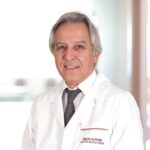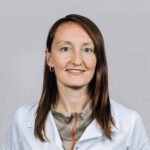Doctors for treatment of Testicular cancer
Doctors for the treatment of testicular cancer
Frequently Asked Questions
This is a mutation of testicular cells with the formation of a malignant tumor.
Formations from gonadal cells — make up more than 90%. Sexual (gonadal) cell tumors are subdivided into:
• seminomas — 65%,
• not seminoma — 35%.
Extragonadal germ cell tumors are located outside the testes and are very rare.
Formations from other cells (Sertoli or Leydig) in the scrotum are rare.
Risk factors include:
- undescended testicles (displacement),
- incomplete development of the urethral opening,
- previous testicular cancer,
- intraepithelial neoplasia of the testicles,
- infertility,
- genetics.
Early symptoms include:
- enlargement, tension or hardening in scrotum,
- accumulation of fluid in the scrotum,
- sensitivity to touch in the groin area,
- breast swelling (caused by female hormones produced by some tumors).
Late symptoms include:
- tiredness,
- nausea,
- weight loss,
- backache,
- shortness of breath.
There are 3 stages:
- The formation is small and does not extend beyond the scrotum.
- Metastases appear in the nearest lymph nodes.
- The tumor grows beyond the scrotum, present distant metastases in organs and lymph nodes.
5-year survival rate is 96% of all men, 10-year survival rate is slightly lower — 95%. The chances of survival or a complete cure are especially high with early diagnosis and proper treatment tactics.
The following types of surveys are carried out:
- sonography of the scrotum (ultrasound),
- test for tumor markers,
- CT or PET-CT,
- MRI,
- biopsy.
The following methods are used:
- orchiectomy,
- of retroperitoneal lymphoectomy,
- targeted therapy,
- radiochemotherapy.
International standards for the diagnosis and treatment of testicular cancer
To make a diagnosis, doctors use:
- Sonography — this is how the doctor determines the size of the neoplasm, its location and density.
- Analysis for tumor markers: hCG, cancer-embryonic antigen and LDH.
- CT/MRI/PET-CT.
- Biopsy and cytological analysis of the obtained material.
International protocols include the following methods:
- Orchiectomy with implantation of an artificial prosthesis,
- Excision of the retroperitoneal lymph nodes — if the tumor has metastasized,
- Chemotherapy according to the HIPEC or PIPAC method,
- Local radiotherapy (brachytherapy),
- IGRT/IMRT,
- Targeted and radiochemotherapy.
Orchiectomy
The operation is relatively simple and safe. During the operation, a tissue sample is obtained and it is determined whether a preliminary stage of testicular tumor (intraepithelial neoplasia of the testis) has developed. If such a precancerous stage is found, radiation therapy is additionally used.
It does not affect sexuality, potency, or the ability to father. A healthy testicle on the opposite side takes over the function of the removed testicle.
A testicular prosthesis can be used as a replacement for a removed testicle — if required for cosmetic reasons. It looks like a healthy testicle and feels like a real one.
Hyperthermic intraperitoneal chemoperfusion (HIPEC)
HIPEC is an extensive surgical removal of a tumor and partial or complete removal of the peritoneum. It is used only in the later stages and is combined with chemotherapy flushing of the abdominal cavity.
Cons: a complex and very stressful method for the human body, not suitable for every patient.
Chemotherapy with pressurized intraperitoneal aerosol (PIPAC)
PIPAC is an innovative method for the treatment of localized disease. This method is performed as part of laparoscopy with a chemotherapeutic solution in the form of an aerosol. The increased pressure in the abdominal cavity provides better tissue accessibility for chemotherapy.
Pros: less invasive method than HIPEC — therefore better tolerated.
Intensity modulated radiation therapy (IMRT)
IMRT is a modern method of radiotherapy. It is especially useful in cases where important organs are close to the tumor.
Pros: due to the large number of radiation angles and high mobility of the device, the risk organs (kidneys) are maximally protected.
Image guided radiation therapy (IGRT)
IGRT is used in advanced overseas hospitals and has advantages over IMRT. This method provides a hardware guarantee of the correct body position. The patient automatically moves in the same position as during treatment planning. The table with 6 levels of motion control guarantees millimeter precision. This ensures that the intended targets are being irradiated properly.







